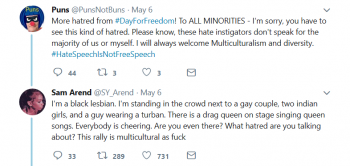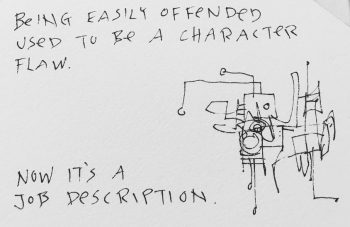I am a radical on Town & Country planning as on other economic issues. I would abolish it. To me it is offensive that the value of a man’s land is stripped from him by laws that deny him the right to put it to its highest and best use without grovelling to local politicians in thrall to his envious neighbours.
|
|||||
|
There’s a conference called A Conservative Renaissance in London today. But I can’t see any renaissance coming to pass whilst the Conservative party is being run by a Blairite. Before any rebirth, the old order needs to die, and given the dire threats we face from within, we don’t have the luxury of waiting for them to literally pop their clogs, so the sooner the better. – A certain Tory who shall not be named. I made a somewhat similar observation myself. I saw a fascinating letter in the Continental Telegraph to Agatha Antigone asking for advice. There is something about it that makes me strongly suspect I know who the man of wealth and taste seeking wise counsel is… any ideas? 🤣😂😜 No, no, not eating Irish children, this is 2018 (not that I have anything against grass-fed Irish children), but rather a modest proposal to ensure national unity:
Seems perfectly reasonable to me 🤪 I found this interesting, just a mere twitter exchange relating to the Day of Freedom rally that you will never see the BBC say much (or indeed anything I suspect) about.  I am increasingly willing to accept almost anyone on the correct side of this as an ally, and if the Guardian wants to tar anyone who supports free speech as ‘far right’, well who cares? It turns out that support for free speech is in fact ‘multicultural as fuck’. I wanted to support the Daniel Hannan classical liberal faction within the Party as it (I hoped) took control. I have been disappointed so far. The nature of the beast is still just as I remembered it and Teresa May – possessor of a second-rate mind untroubled by principle – is its archetype. I was a Conservative Party counting agent at my local authority elections this week and spent a few hours in the dejected company of candidates and volunteers in a solidly Labour London Borough. My impression was of a Party that sees Labour as the engine and itself as the brakes. Or perhaps more kindly Labour as the arsonists and itself as the Fire Brigade. No Marxist ever subscribed so thoroughly to his doctrine of “historical inevitability” as these people. A consumer regulator might usefully force both parties to change their names to the “Let’s Fuck it Up” and the “Let’s Fuck it Up More Slowly” Parties. The only encouragement I took from the evening was when I wandered off and mooched around the Labourites. My God, what an unappealing bunch they are, at least in London. There has been, as we know, much fuss over how Russian Twitter ‘bots backed both Brexit and Donald Trump. This is an interference with our democracy which just cannot be lived with, something must be done. You know, regulate Twitter so that nothing so appalling as anyone ever using it to support non-progressive causes can ever happen again. That not being quite how free speech nor freedom of the press is supposed to work of course. Expect some of this to die down a little now that we know that those same Twitter ‘bots – from Russia, you know – backed Jeremy Corbyn at the last General Election. You cannot legislate the poor into prosperity by legislating the wealthy out of prosperity. What one person receives without working for, another person must work for without receiving. The government cannot give to anybody anything that the government does not first take from somebody else. When half of the people get the idea that they do not have to work because the other half is going to take care of them, and when the other half gets the idea that it does no good to work because somebody else is going to get what they work for, that my dear friend, is the beginning of the end of any nation. You cannot multiply wealth by dividing it. And if you like the idea that a comedian convicted a making a joke in bad taste and fined £800 by a Scottish court could end up making a tidy profit, you might want to drop your mouse on this link and send him some money. I did 😀 Help Markus stop a truly terrible precedent being set and help fund the appeal. If there is any money left over, he promises to invade the Sudetenland. |
|||||

All content on this website (including text, photographs, audio files, and any other original works), unless otherwise noted, is licensed under a Creative Commons License. |
|||||




